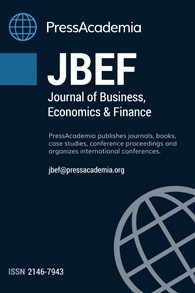ANALYZING THE SOCIAL FACTORS AFFECTING AVIATION DEVELOPMENT IN COUNTRIES BY CREATING A MIXED CURVILINEAR REGRESSION MODEL
Purpose- The objective of this study is to determine the social factors of countries that are effective in the development of aviation and to measure their effects on aviation development by creating a mixed curvilinear regression model. Methodology- The study is started with a literature review to determine the possible effective social factors on aviation development and then a mixed curvilinear regression model is developed to measure the weights of these factors. Findings- 15 different social factors were examined to produce inputs for the regression model. Feature selection of regression model is examined and the reasons for eliminating the features were investigated. The weights of the social factors included in the regression model relative to each other was measured. Conclusion- Aviation has been battling the devastating impact of the Covid-19 outbreak since the beginning of 2019. Now, the importance of every passenger, the value of the money spent on investments and impact of airport efficiencies have increased to a level which is never touched before. This study is carried out to enrich the research conducted before investments in the aviation industry.
___
- Arvis, J. F., Ojala, L., Wiederer, C., Shepherd, B., Raj, A., Dairabayeva, K., & Kiiski, T. (2018). Connecting to compete 2018: trade logistics in the global economy. World Bank.
- Ayanso, A., Cho, D. I., & Lertwachara, K. (2011). ICT development index and the digital divide. In International conference on information resources management (CONF-IRM 2011) proceedings, Seoul, South Korea. Retrieved from http://aisel. aisnet. org/confirm2011/3.
- Bangwayo-Skeete, P. F., & Skeete, R. W. (2017). Who travels visa-free? Insights into tourist hassle-free travel. Journal of Travel Research, 56(3), 407-418.
- Calhoun, K. J., Teng, J. T., & Cheon, M. J. (2002). Impact of national culture on information technology usage behaviour: an exploratory study of decision making in Korea and the USA. Behaviour & Information Technology, 21(4), 293-302.
- Chen, Z. (2018). A Comparison of Short-and Long-Haul Vacation Tourists on Evaluation of Attractiveness: The Case of Hong Kong. World Academy of Science, Engineering and Technology, International Journal of Humanities and Social Sciences, 5(2).
- Cook, A. J., Kluge, U., Paul, A., & Cristóbal, S. (2017, February). Factors influencing European passenger demand for air transport. In Air Transport Research Society World Conference. Air Transport Research Society.
- Corcoran, A., & Gillanders, R. (2015). Foreign direct investment and the ease of doing business. Review of World Economics, 151(1), 103-126.
- Curley, A., Dichter, A., Krishnan, V., Riedel, R., & Saxon, S. (2020). Coronavirus: Airlines brace for severe turbulence.
- Dębski, M., & Nasierowski, W. (2017). Criteria for the selection of tourism destinations by students from different countries. Foundations of Management, 9(1), 317-330.
- Gaye, A., Klugman, J., Kovacevic, M., Twigg, S., & Zambrano, E. (2010). Measuring key disparities in human development: The gender inequality index. Human development research paper, 46, 1-37.
- Gössling, S., Scott, D., & Hall, C. M. (2020). Pandemics, tourism and global change: a rapid assessment of COVID-19. Journal of Sustainable Tourism, 29(1), 1-20.
- Gudmundsson, S. V., Cattaneo, M., & Redondi, R. (2021). Forecasting temporal world recovery in air transport markets in the presence of large economic shocks: The case of COVID-19. Journal of Air Transport Management, 91, 102007.
- Hassan, Z., & Basit, A. (2018). Ease of doing business and its impact on inward FDI. Hossain, MT, Hassan, Z., Shafiq, S., & Basit, A.(2018). Ease of Doing Business and Its Impact on Inward FDI. Indonesian Journal of Management and Business Economics, 1(1), 52-65.
- Index, G. P. (2018). Measuring peace in a complex world. Institute for Economics & Peace.
- Ishutkina, M. A., & Hansman, R. J. (2011). Analysis of the interaction between air transportation and economic activity: a worldwide perspective.
- İslamoğlu, E., YILDIRIMALP, S., & Benli, A. (2014). Türkiye’de tersine göç ve tersine göçü teşvik eden uygulamalar: İstanbul ili örneği. Sakarya İktisat Dergisi, 3(1), 68-93.
- Kwan, M. P., Dijst, M. J., & Schwanen, T. (2007). The interaction between ICT and human activity-travel behavior. Transportation research. Part A, policy and practice, 41(2), 121-124.
- Nguefack‐Tsague, G., Klasen, S., & Zucchini, W. (2011). On weighting the components of the human development index: a statistical justification. Journal of Human development and Capabilities, 12(2), 183-202.
- Oxley, D. IATA, 2018, pp. 1–4, AIR PASSENGER MARKET ANALYSIS.
- Özpolat, V. (2012). Küreselleşme sürecinde yurt dışındaki Türklerin önemi. Dumlupınar Üniversitesi Sosyal Bilimler Dergisi, (34), 211-219.
- Schafer, A., & Victor, D. G. (2000). The future mobility of the world population. Transportation Research Part A: Policy and Practice, 34(3), 171-205.
- Serrano, F., & Kazda, A. (2020). The future of airport post COVID-19. Journal of Air Transport Management, 89, 101900.
- Silvey, R. (2006). Consuming the transnational family: Indonesian migrant domestic workers to Saudi Arabia. Global networks, 6(1), 23-40.
- Tabares, D. A. (2021). An airport operations proposal for a pandemic-free air travel. Journal of Air Transport Management, 90, 101943.
- Tayco, R. (2013). Tourist arrivals and peace indices: Ascertaining the impact of the irregularities and ruggedness of peace situation on tourism across the globe. NORSU. Prism, 18(1).
- Taylor, J. E. (2006, June). International migration and economic development. In International symposium on international migration and development (pp. 28-30).
- Woolman, D. C. (2001). Educational reconstruction and post-colonial curriculum development: A comparative study of four African countries. International Education Journal, 2(5), 27-46.
- World Bank. (2017). Doing business 2018: reforming to create jobs. The World Bank.
- Zheng, S., Duan, L., & Sun, W. (2020). Global air network and cross-border venture capital mobility. Habitat International, 106, 102105.
- Yayın Aralığı: Yılda 4 Sayı
- Başlangıç: 2012
- Yayıncı: PressAcademia
